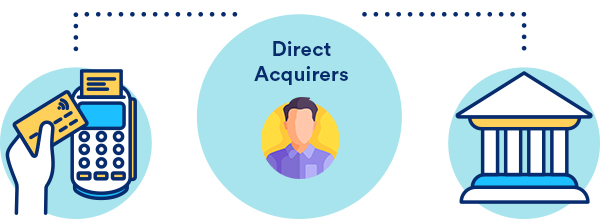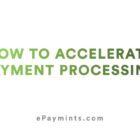Within the dynamic landscape of financial transactions, a fundamental question arises: Should your business employ payment gateways or direct acquirers? Let’s explore the advantages and disadvantages of each payment method so you can choose the one that aligns with your enterprise’s unique needs and goals.
Understanding payment gateways
Payment gateways are intermediaries between merchants and payment processors that facilitate secure online transactions. When a customer makes a transaction, the payment gateway serves as the bridge, carrying out a series of security checks and relaying the information to the relevant financial institutions via the payment processor to verify and authorize the payment.
Advantages of payment gateways
- Enhanced security: Payment gateways utilize robust security measures to protect sensitive financial information from potential threats.
- Global reach: By accepting various payment methods, gateways empower companies to cater to a diverse customer base, transcending geographical boundaries.
- Convenience: Gateways streamline the payment process, creating a positive user experience that fosters customer satisfaction and loyalty.
Disadvantages of payment gateways
- Transaction fees: Payment gateways usually charge transaction fees for processing payments, which can vary based on the type of transaction, payment method used, and volume of transactions. These fees can accumulate for businesses with high transaction volumes and impact overall operational costs.
- Chargebacks and disputes: Payment gateways are involved in the resolution process for chargebacks and disputes, making it time-consuming.

The role of direct acquirers
Direct acquirers are entities between merchants and their card networks and financial institutions. Unlike payment gateways, they are directly linked to these networks through an established relationship, eliminating the need for an intermediary layer. When a customer makes a transaction, their credit card information and transaction details go through the direct acquirer, who securely communicates the information with the relevant payment networks to authorize and process the transaction.
Advantages of direct acquirers
- Cost efficiency: Transaction fees may be negotiated lower for high-volume businesses, providing cost benefits.
- Faster settlements: Transactions are often settled faster, resulting in quicker access to funds and fewer delays, benefiting cash flow.
- Reduced complexity: The direct relationship may lead to a simpler and more efficient payment-processing experience.
Disadvantages of direct acquirers
- Complex onboarding: The onboarding process with direct acquirers can be more intricate, requiring comprehensive documentation and approval procedures.
- Limited payment options: Unlike gateways, direct acquirers may have limitations on the range of payment methods they support.

Payment method considerations
When choosing between gateways and direct acquirers, organizations must consider several critical factors, from user experience and customer service to security and compliance.
User experience and customer satisfaction
The chosen payment method should be intuitive for customers to navigate while accommodating various payment options, handling different currencies, and integrating with other aspects of the business’s technology infrastructure.
Payment gateways, which are often focused on ease of use and functionality, provide interfaces that are generally familiar to customers. They also support a wide array of payment methods and are designed to integrate with multiple platforms.
On the other hand, direct acquirers might offer interfaces tailored to specific systems, potentially requiring users to adapt to a unique workflow. Additionally, they may have limited functionalities and cater to certain industries or transaction types.
Integration scalability
Your selected payment method should seamlessly integrate with existing technology while supporting your organization’s growth trajectory. This includes being able to handle increasing transaction volumes, expanding product catalogs, and changing business models.
Payment gateways typically offer a range of plug-ins and application programming interfaces (APIs) that facilitate integration with third-party applications and systems. They enable companies to maintain a cohesive and interconnected technology ecosystem while providing a flexible architecture for scalability.
Compatibility and scalability can vary among direct acquirers. They should be assessed with an organization’s existing technology infrastructure to determine which can integrate smoothly and manage increased data flow and transaction complexities.
Security and compliance
Although payment gateways and direct acquirers generally comply with industry regulations and implement security features, businesses must thoroughly evaluate potential options to ensure strict adherence and comprehensive protection, such as advanced encryption protocols, tokenization, multifactor authentication, regular monitoring and auditing, and robust fraud prevention and detection mechanisms.
Cost structures and transparency
The protection of financial data should not come at the cost of exorbitant fees. Both payment gateways and direct acquirers have varying fee structures, including transaction fees, monthly subscription fees, and potential hidden charges for certain features or services. Organizations should scrutinize the cost structures of any prospective payment method before making their choice.
This transparency also extends to the terms and conditions, such as potential changes to fee structures over time. Clear communication from payment providers not only promotes a trusting relationship but also allows businesses to make better-informed financial decisions.
Secure your payments with ePaymints
Choosing between payment gateways and direct acquirers is not a one-size-fits-all decision. Each method has its merits and challenges. The right choice will depend on your enterprise’s unique needs and goals. By carefully considering critical factors like user experience, integration scalability, security, and cost structures, companies can select a payment method that enables seamless and secure payment processes.
For help determining the best payment solution for your business transactions, contact the experts at ePaymints.com and upgrade your payment-processing experience.








